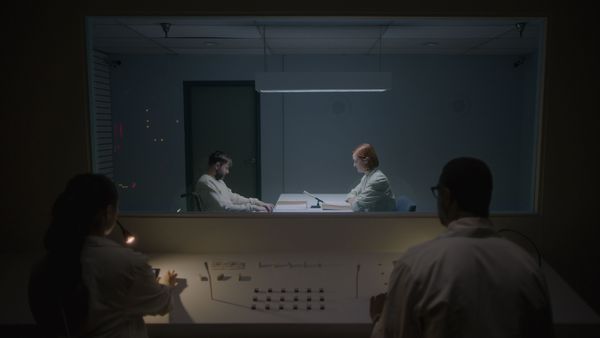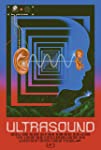Eye For Film >> Movies >> Ultrasound (2021) Film Review
Ultrasound
Reviewed by: Jennie Kermode

As Glen (Vincent Kartheiser) stumbles through the darkness and the rain away from his car, which has gone off the road after hitting a piece of wood with nails in, he sees something that shouldn't be there: a cluster of objects seemingly abandoned on the ground. It's the sort of detail one quickly forgets about. Our minds are very good at erasing anomalies and filling in gaps, which is why we often fail to spot mistakes in films and argue over exactly what happened in things we've just seen. It's part of how we contrive to make sense of the world around us even in deeply unsettling situations.
Fortunately for Glen, who is shivering with cold, there's a house nearby and its owners are welcoming. Art (Bob Stephenson), who explains that they rarely get company, encourages him to enjoy a few drinks. Then he suggests that Glen sleep with his much younger wife, Cyndi (Chelsea Lopez). This isn't really Glen's kind of scene and he tries to explain as much but ends up going through to the bedroom anyway, if only to make a polite escape from Art. There he gets talking to Cyndi and things end up happening between them. The next day, with no-one around, he leaves - but he will see Art again, and in stranger and stranger circumstances.
In a psychological research institution, Shannon (Breeda Wool) studies the therapeutic potential of hypnosis, working with a system of electronic tones developed by a colleague who has since gone his own way. Her work includes elements of role play and, at times, seems to involve working with a script which borrows lines from the scenario we've just seen play out. What is going on? Who exactly are the people she's working with, and does she fully understand the objectives of her employers?
There's a trick that stage hypnotists use, engaging in some small, apparently unconscious action such as squeezing a thumb and forefinger together, then identifying those audience members who are mirroring the action and selecting them as subjects. Consensus is often arrived at unconsciously. Brain scans are unable to tell memory from fiction precisely because memory is fiction, a narrative reconstruction full of assumptions, short cuts and discreet edits. Director Rob Schroeder knows the game well.
Ultrasound is a slippery little puzzle of a film. It's cleverly put together and really quite neatly tied together, though not every viewer will successfully unravel it or, for that matter, make it to the end. It has often been observed that skill with puzzles and emotional intelligence don't necessarily go together. This is intellectually engaging but for a long time, so emotionally empty that it's likely to frustrate a general audience. It takes us a long time to understand what's going on with the characters and in the meantime it's difficult for us to care about their fate. Bear with it, however, and you will find that this aspect changes - indeed, one of the points it's making seems to be that personalities are constant regardless of circumstance.
Like Christopher Nolan's The Prestige, this film presents us with a dazzling array of parlour tricks (and includes, at one point, an actual stage hypnotist) as sleight of hand. Underneath is a much deeper set of ethical and political concerns. It gets away with its layers of uncertainty in two ways: first by utilising the talents of a highly capable cast, and secondly by finding a clever solution to the problem that its central characters face. This, incidentally, delivers a key anti-interrogation skill to audience members previously unfamiliar with such tricks. The audience is itself part of the experiment - pay attention to Zak Engel’s cleverly constructed electronic score and you can identify some of the same tricks used in the institution. Amongst other things, it's an invitation to sit back and think about how you're manipulated by almost every film you watch.
Can the institution's subjects truly be said to be there voluntarily? If they were to begin with, was there a point when that changed? How much control did Glen really have over his actions after his car hit that piece of wood? How much control do you have over yours? Are you squeezing your thumb and forefinger together?
Reviewed on: 20 Jun 2021

















